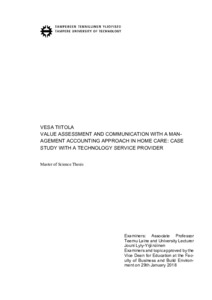Value assessment and communication with a management accounting approach in home care: Case study with a technology service provider
Tiitola, Vesa Tapio (2018)
Tiitola, Vesa Tapio
2018
Tuotantotalous
Talouden ja rakentamisen tiedekunta - Faculty of Business and Built Environment
This publication is copyrighted. You may download, display and print it for Your own personal use. Commercial use is prohibited.
Hyväksymispäivämäärä
2018-03-07
Julkaisun pysyvä osoite on
https://urn.fi/URN:NBN:fi:tty-201802231311
https://urn.fi/URN:NBN:fi:tty-201802231311
Tiivistelmä
Home care organizations in Finland are facing a strong dilemma with increasing demand and a need to decrease costs. Some technology service providers have developed solutions that can help home care organizations face these challenges, but municipalities remain sceptic towards these solutions creating new challenges within both the purchase processes and the implementation. Thus, the objective of this thesis is to discuss a way to face these issues by exploring the possibilities related to using a management accounting approach in value assessment and communication in home care context. The thesis hence contributes to the research gaps in how management accounting can support value assessment and how value and financial information are perceived in home care.
The thesis draws on literature concerning customer value, management accounting, decision-making and home care. The objective is approached using as a case study with a technology service provider in homecare context. The empirical study follows an interventionist approach. A value assessment was conducted within five homecare organizations by using existing data and interviews to document the effects of the offering, which were later measured using cost assessment. The value and cost assessment processes and the related communication are narrated to discuss the process and related findings.
Value assessment proved to be an efficient tool in documenting customer value and seemed to provide important information to both the case company and its customers. Not only could the management accounting tools be applied within the value assessment process, but even more importantly within the cost assessment to measure the significance of the identified value elements. The value assessment and management accounting could also be used to identify and measure a new and significant value element related to the resource perspective.
It would seem that companies could benefit from including a management accounting specialist within the value assessment process. Additionally, it seems that the stakeholder perspective is a relevant issue to take into consideration when communicating either value or financial information within homecare context. As such, this thesis contributes on both emic and etic level by both documenting the customer value within the case context, narrating the process of performing a value assessment in home care and discussing the role of management accounting in assessing and communicating value in homecare context.
The thesis draws on literature concerning customer value, management accounting, decision-making and home care. The objective is approached using as a case study with a technology service provider in homecare context. The empirical study follows an interventionist approach. A value assessment was conducted within five homecare organizations by using existing data and interviews to document the effects of the offering, which were later measured using cost assessment. The value and cost assessment processes and the related communication are narrated to discuss the process and related findings.
Value assessment proved to be an efficient tool in documenting customer value and seemed to provide important information to both the case company and its customers. Not only could the management accounting tools be applied within the value assessment process, but even more importantly within the cost assessment to measure the significance of the identified value elements. The value assessment and management accounting could also be used to identify and measure a new and significant value element related to the resource perspective.
It would seem that companies could benefit from including a management accounting specialist within the value assessment process. Additionally, it seems that the stakeholder perspective is a relevant issue to take into consideration when communicating either value or financial information within homecare context. As such, this thesis contributes on both emic and etic level by both documenting the customer value within the case context, narrating the process of performing a value assessment in home care and discussing the role of management accounting in assessing and communicating value in homecare context.
